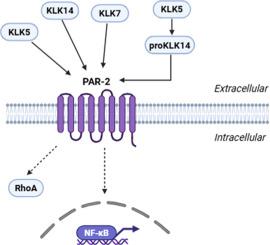KLK5和KLK7通过klk14依赖性RhoA和NF-κB途径驱动宫颈癌
IF 5
2区 医学
Q2 Medicine
引用次数: 0
摘要
人类乳头瘤病毒(HPV)感染的全球患病率约为12%,这对宫颈癌的发展有重要贡献,因为HPV是肿瘤发生的关键驱动因素。然而,HPV促进癌变的确切机制以及在这一过程中其他成分的参与仍然知之甚少。目的:鉴于丝氨酸蛋白酶在癌症发生中的关键作用,我们研究了它们在hpv介导的癌变背景下对宫颈癌发展的贡献。方法分析人类活组织检查丝氨酸蛋白酶的表达情况,包括基质酶、小肽激酶5 (KLK5)和小肽激酶7 (KLK7)及其内源性抑制剂。利用基因工程小鼠、大量rna测序和报告基因分析进行了机制研究,以阐明这些蛋白酶在hpv依赖性宫颈癌发生中的作用。结果基质酶、KLK5和KLK7在早期宫颈癌中表达升高。此外,KLK5和KLK7的缺失通过调节KLK14的激活改善了hpv依赖性表型。KLK14通过调节par -2依赖性RhoA和NF-κB信号通路显示促肿瘤作用。结论丝氨酸蛋白酶KLK5、KLK7和KLK14在宫颈癌发生中的重要作用,提示这些丝氨酸蛋白酶有望开发新的宫颈癌治疗策略。本文章由计算机程序翻译,如有差异,请以英文原文为准。

KLK5 and KLK7 drive cervical carcinoma via KLK14-dependent RhoA and NF-κB pathways
Background
The global prevalence of Human Papillomavirus (HPV) infection is approximately 12%, which significantly contributes to the development of cervical cancer as HPV is a key driver of tumorigenesis. However, the precise mechanisms by which HPV promotes carcinogenesis and the involvement of additional components in this process remain poorly understood.
Objective
Given the evidence supporting the critical role of serine proteases in carcinogenesis, we investigated their contribution to cervical cancer development in the context of HPV-mediated carcinogenesis.
Methods
Human biopsies were analyzed to assess the expression of serine proteases, including matriptase, kallikrein 5 (KLK5), and kallikrein 7 (KLK7), as well as their endogenous inhibitors. Mechanistic studies were conducted using genetically engineered mice, bulk RNA-seq, and reporter assays to elucidate the role of these proteases in HPV-dependent cervical carcinogenesis.
Results
Our findings demonstrate increased expression of matriptase, KLK5, and KLK7 in early cervical carcinogenesis. Furthermore, the absence of both KLK5 and KLK7 ameliorates the HPV-dependent phenotype via modulation of KLK14 activation. KLK14 exhibits a pro-tumorigenic effect by regulating PAR-2-dependent RhoA and NF-κB signaling pathways.
Conclusion
This study underscores the critical roles of serine proteases KLK5, KLK7, and KLK14 in cervical carcinogenesis, suggesting that these serine proteases are promising targets for the development of novel therapeutic strategies in cervical cancer.
求助全文
通过发布文献求助,成功后即可免费获取论文全文。
去求助
来源期刊

Translational Oncology
ONCOLOGY-
CiteScore
8.40
自引率
2.00%
发文量
314
审稿时长
54 days
期刊介绍:
Translational Oncology publishes the results of novel research investigations which bridge the laboratory and clinical settings including risk assessment, cellular and molecular characterization, prevention, detection, diagnosis and treatment of human cancers with the overall goal of improving the clinical care of oncology patients. Translational Oncology will publish laboratory studies of novel therapeutic interventions as well as clinical trials which evaluate new treatment paradigms for cancer. Peer reviewed manuscript types include Original Reports, Reviews and Editorials.
 求助内容:
求助内容: 应助结果提醒方式:
应助结果提醒方式:


